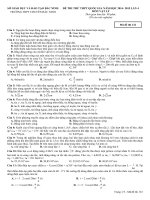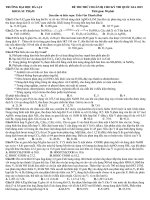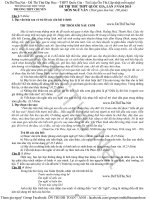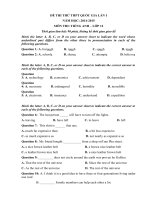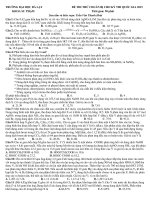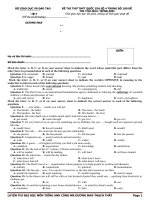De va DA thi Anh thu THPT Quoc Gia lan 4 de 2 1819 Tr Nguyen Trai
Bạn đang xem bản rút gọn của tài liệu. Xem và tải ngay bản đầy đủ của tài liệu tại đây (112.76 KB, 6 trang )
SỞ GIÁO DỤC VÀ ĐÀO TẠO
THÁI BÌNH
TRƯỜNG THPT NGUYỄN TRÃI
ĐỀ THI THỬ ĐẠI HỌC LẦN VI
NĂM HỌC: 2018-2019
MÔN: TIẾNG ANH
Thời gian làm bài: 60 phút (không kể thời gian
giao đề)
Mark the letter A, B, C or D on your answer sheet to indicate the word whose underlined
part is pronounced differently from that of the rest in each of the following questions.
Question 1. A. washed
B. passed
C. worked
D. opened
Question 2. A. dance
B. make
C. face
D. hate
Mark the letter A, B, C or D on your answer sheet to indicate the word that is differently
stressed from that of the rest in each of the following questions.
Question 3. A. teacher
B. lesson
C. action
D. police
Question 4. A. economics B. biology
C. experiment
D. philosophy
Mark the letter A, B, C or D on your answer sheet to indicate the correct answer to each of the
following questions.
Question 5. We are considering having ______ for the coming new year.
A. redecorated our flat
B. our flat redecorated
C. to redecorate our flat
D. our flat to be redecorated
Question 6. By the 20th of this month, I ______ for exactly ten years.
A. will have been worked
B. will work
C. will have worked
D. will be working
Question 7. She has just bought ______.
A. a reddish impressive wood French coffee table
B. an impressive reddish French wood coffee table
C. an impressive French reddish coffee wood table
D. an impressive French wood reddish coffee table
Question 8. Mai is going to take extra lessons to ______ what she missed when she was away.
A. catch up on
B. cut down on
C. take up with
D. put up with
Question 9. The meeting has been brought ______ to Monday due to the seriousness of the
situation.
A. on
B. out
C. down
D. forward
Question 10. The teacher recommended that Linda ______ her essay as soon as possible.
A. finish writing
B. finished writing
C. should finish to write
D. finishes writing
Question 11. I locked my door of my room all day yesterday to avoid _____ .
A. disturbing
B. to disturb
C. being disturbed
D. to be disturbed
Question 12. It gets ______ to understand what the professor has explained.
A. the more difficult
B. more and more difficult
C. the more and the more difficult
D. more and the more difficult
Question 13. After we each had been assigned an installment part of the project, we came back
to our ______ section.
A. respectively
B. respectful
C. irrespective
D. respective
Question 14.The computer has had an enormous ______ on the way we work.
A. change
B. alteration
C. influence
D. impression
Question 15. Our last hopes would ______ all probability evaporate.
A. on
B. in
C. of
D. for
Question 16. Travelling to ______ countries in the world enables me learn many interesting
things.
A. differ
B. difference
C. differently D. different
Question 17. We shouldn’t use too many plastic bags because they are very hard to ______.
A. dissolve
B. melt
C. heat
D. soften
Question 18. We’ve been _______ with my friends for a couple of years.
A. out of reach
B. out of the condition
C. out of the question
D. out of touch
Mark the letter A, B, C, or D on your answer sheet to indicate the word or phrase that is
CLOSEST in meaning to the underlined part in each of the following s.
Question 19. The most irritating people are those who always disturb others by asking really
stupid questions.
A. annoying
B. exciting
C. hopeful
D. cheerful
Question 20. Don’t forget to drop me a line when you are away.
A. call me
B. give me a ring
C. drop in me
D. write to me
Mark the letter A, B, C, or D on your answer sheet to indicate the word or phrase that is
OPPOSITE in meaning to the underlined part in each of the following questions.
Question 21. The law holds parents liable if a child does not attend school.
A. parental
B. unhappy
C. dutiful
D. irresponsible
Question 22: Many parents always kept a tight rein on their children.
A. gave less money
B. let loose
C. set free
D. helped to ride
Mark the letter A, B, C, or D on your answer sheet to indicate the most suitable response to
complete each of the following exchanges.
Question 23. Marry is thanking David for his birthday present.
- Marry: “Thanks for the book. I’ve been looking for it for months.”
- David: “_______ ”
A. You can say that again
B. Thank you for looking for it
C. I like reading books
D. I’m glad you like it
Question 24. Two students are talking about the school curriculum.
- Lan: “ Swimming should be taught in the school.”
- Nam: “_______. It is an essential skill.”
A. Oh, that’s a problem
B. I can’t agree with you more
C. not at all
D. you can make it
Mark the letter A, B, C or D on your answer sheet to show the underlined part that needs
correction
Question 25.My friends and I enjoy playing the guitar and have a walk in the forest.
A. friends and I
B. the guitar
C. have a walk
D. in
Question 26. With the victory over Germany in the final match, Brazil became the first team
won the trophy five times.
A. over
B. the final match
C. won
D. five times
Question 27. Being that he was a good swimmer, John managed to rescue the child.
A. that he was
B. swimmer
C. to rescue
D. the child
Mark the letter A, B, C or D on your answer sheet to indicate the sentence that is closest in
meaning to the original sentence(s) in each of the following questions.
Question 28. They cancelled all the sporting events because of the heavy rain.
A. But for the heavy rain, they wouldn’t cancel all the sporting events.
B. If it hadn’t rained heavily, they would have cancelled all the sporting events.
C. If it didn’t rain heavily, they wouldn’t cancel all the sporting events.
D. Had it not rained heavily, they wouldn’t have cancelled all the sporting events.
Question 29. He last visited me three years ago.
A. He has visited me for three years.
B. He hasn’t visited me for three years.
C. He didn’t visit me three years ago.
D. He visited me for three years.
Question 30. “Why don’t you have your room repainted?”, said Bob to Linda.
A. Bob suggested having Linda’s room repainted.
B. Bob asked Linda why she didn’t repaint her room.
C. Bob suggested that Linda should have her room repainted.
D. Bob suggested that Linda should repaint her room.
Mark the letter A, B, C or D on your answer sheet to indicate the sentence that best
combines each pair of sentences in the following questions.
Question 31. Ann was not here yesterday. Perhaps she was ill .
A. Ann might have been ill yesterday, so she was not here yesterday.
B. Ann needn’t be here yesterday because she was ill.
C. Because of her illness, Ann shouldn’t have been here yesterday.
D. Ann must have been ill yesterday, so she was not here.
Question 32. It isn’t that the level of education of this school is high. It’s that it’s also been
consistent for years.
A. The level of education in this school, which is usually quite high, shows only slight variations
from year to year.
B. The standard of education is not high in this school, but at least all the students are at the same
level.
C. Not only are the standards of education good in this school, but it has maintained those
standards over the years as well.
D. Not only are the standards of education good in this school, but it also maintained those
standards over the years as well.
Read the following passage and mark the letter A, B, C or D on your answer sheet to
indicate the correct answer to each of the following questions.
It's in Your Genes
Every human being has about 25,000 genes. Your genes are part of your DNA. They give
your body instructions on how to develop. For example, if your genes tell your body to build
long, thin fingers, then you will have long, thin fingers.
Your genes come from your parents, and they decide everything about you. They decide your
hair colour, your eye colour, your height, and so on. Genes are still a bit of a mystery to
scientists, but they are learning new things about them all the time.
One issue that people often debate is this: Do our genes influence our personalities? These
days, most people agree that the answer to this question is yes. Recent studies have shown that
genes especially influence our self-control and our sense of purpose. Your sense of purpose is
your desire to have goals in your life. If a person really wants to accomplish something and do
well in life, he or she has a sense of purpose. A person who does not care about goals has no
sense of purpose.
Although scientists agree that our genes influence our personalities, there is another question.
How much do they influence us? Can we control ourselves, or do our genes control us? People
everywhere are still debating this issue. So far, we don’t really have an answer.
Genes also affect your health. If a gene has a problem, it is called a mutated gene. Some
mutated genes can cause diseases. That is why if a person has a certain health problem, his or her
child is more likely to have that same problem. The child also has the mutated gene.
As scientists and doctors learn more about genes, they are also developing a new kind of
medicine: gene therapy. Therapy is help for a mental or a physical problem. Gene therapy means
fixing or replacing mutated genes. Scientists are still experimenting on gene therapy. It is
possible that in the future, gene therapy will help doctors prevent and cure diseases that are
caused by mutated genes.
Question 33. What does the passage say about genes and personality?
A. We still don’t know how much genes affect personality.
B. We know that genes control our personality completely.
C. We know that genes don’t affect our personality at all.
D. Nobody has studied the effects of genes on personality.
Question 34. The word “mutated” in paragraph 5 refer to _______
A. differently changed
B. developed quickly
C. self-controlled
D. hereditary
Question 35. Which of the following is NOT influenced by genes?
A. Parts of our body. B. Personalities. C. Sense of purpose D. Gene therapy
Question 36. The word “them” in paragraph 2 refer to _______
A. scientists
B. parents
C. genes
D. mysteries
Question 37. What might a person with a strong of purpose do?
A. Stay at home and watch TV all day.
B. Spend a lot of time having fun with friends.
C. Do well in school and try to get a very good job.
D. Stay at home and read books all day.
Read the following passage and mark the letter A, B, C or D on your answer sheet to
indicate the correct answer to each of the following questions.
Non-verbal communication is a wordless form of communication. It is mainly a silent form
of communication that does not involve speech or words. Non-verbal communication is done
through eye contact, hand movement, touch, facial expressions, bodily postures and non-lexical
components, etc. At times, silence is said to the best form of non-verbal communication.
One example of non-verbal communication is dancing. When we dance, we can express so
many different emotions. From passion to religious devotion, dancing either alone, with another
person as part of a couple or in a synchronized group, can communicate so much. Dancing is
something that many of us engage in from childhood and it becomes an important way of
socializing and expressing ourselves at the same time.
Body language including bodily movement and postures is a language all of its own. Our
posture, and the way that we lean forward or back or cross or uncross our legs can speak
volumes about us. Very often, we are not even aware that we are communication our thoughts
via our body language. That is the reason why, in job interviews and other situations in which we
are under scrutiny, it is a good idea to pay attention to our body language. For example, leaning
forward can be a sign of positivity, whilst sitting with our arms folded can make us look closed
off – as if we have something to hide.
What we wear can often communicate things. For example, if we dress up in academic
robes, it is clear that we want to communicate to everyone who sees us that we have attained a
certain level of academic achievement. We should never judge people by what they wear –
however, some types of official garments (such as a judge’s wig, a scholar’s gown or a soldier’s
medal) are designed to communicate something about the wearer.
Silence is also a type of non-verbal communication. Sometimes, staying silent can
communicate much more than words can. Silence can be powerful, sad, happy or it can simply
communicate to other people that we do not want to engage with them. Good communicators are
able to listen, and to use comfortable silences, to connect with other people. There is no need to
think that communication is all about words!
Effective communication, as is abundantly clear from the discussion above, involves not
just listening to other people’s words and expressing ourselves in words. It also means picking
up on other people’s non-verbal cues. Why not go through the list above and think about which
forms of non-verbal communication you are adept at understanding. Are there any ways in which
you might improve your non-verbal communication skills? We could all benefit from a little
improvement in this area, as it enables us to enjoy deeper and more meaningful connections with
other people.
(Source: )
Question 38. What does the passage mainly discuss?
A. Some types of wordless form of communication.
B. Some types of effective form of communication.
C. Communication and its effective forms.
D. Non-verbal communication and its benefits.
Question 39. The word “engage” in paragraph 2 is closest in meaning to _______
A. attract
B. participate
C. occupy
D. employ
Question 40. The word “them” in paragraph 5 refers to _______
A. words
B. silences
C. good communicators D. other people
Question 41. Which of the following is considered as a positive sign of body language at a job
interview?
A. uncrossing legs
B. paying attention to volumes
C. leaning forward
D. sitting with folded arms
Question 42. Which of the following is NOT mentioned as types of official clothes?
A. a judge’s wig
B. a scholar’s dress C. a trooper’s medal
D. a doll’s gown
Question 43. Which of the following statement is TRUE about silence according to paragraph
5?
A. Silent communication is always much more effective than speech.
B. Silence can have more than one meaning.
C. Silence is one of the ways people use to communicate to others.
D. Good communicators are able to use comfortable silences to contact with other people.
Question 44. The word “picking up on” in paragraph 6 is closest in meaning to _______
A. understanding
B. giving attention to C. improving
D. increasing
Question 45. Which of the following can be inferred from the passage?
A. Body language is the most useful form of communication.
B. When people cannot speak, they can use non-verbal communication.
C. It’s impossible to think that communication is all about words.
D. Communication is done through not only words but also non-verbal cues.
Read the following passage and mark the letter A, B, C, or D on your answer sheet to
indicate the correct word for each of the blanks.
Swim, Cycle, and Run
For the athletes who like to (46)________ a variety of endurance sports in a single race,
triathlons are a great fit. Thee competitions (47) ________ running, cycling, and swimming into
one race, and they take place one after the other in a single continuous timed race. Athletes who
participate must be in top physical form and have the skills needed to complete each portion of
the race.
Training for triathlons means the athletes have to become proficient not only in the sport
required in each stage, but they also have to become familiar with what (48) ________ from one
to the other does to their bodies. Many inexperienced triathletes are surprised to (49) ________
hard it can be to switch from swimming to cycling to running, and how tired their muscles can
suddenly feel. One thing all triathletes can agree (50) ________ is that no one ever told them that
running a triathlon would be easy.
Question 46. A. compete
B. compete in
C. take part D. contest
Question 47. A. join
B. connect
C. fasten
D. combine
Question 48. A. transference
B. transmission
C. transition D. transport
Question 49. A. find what
B. find out why
C. find how D. find out how
Question 50. A. on
B. with
C. in
D. at
